SECOND UPDATE ON NIGER CRISIS : STAND-OFF BETWEEN ECOWAS AND NIGER JUNTA CONTINUES
Highlights:
Domestic opposition remains inside Nigeria, which Tinubu would find difficult to ignore.
President of ECOWAS Commission, who is Gambian, urges military intervention in Niger.
In line with the wishes of the smaller member-states, the final communique issued by ECOWAS urges military intervention to restore constitutional order in Niger, citing the recalcitrance of the new military junta.
In line with Tinubu's wishes, a seemingly contradictory line was inserted at the bottom of the ECOWAS communique stating that constitutional order in Niger would be restored by peaceful means.
African Union endorses the ECOWAS Communique on Niger situation.
A nuanced discussion on where USA, France, UK and EU fit into the current political situation in Niger and the wider West African subregion.
A discussion of Niger's place in the world production of uranium and the impact of military junta’s ban on the sale of uranium to France.
INTERNAL OPPOSITION TO INTERVENTION INSIDE NIGERIA
#1.
Domestic opposition within Nigeria over possible intervention in Niger Republic continues to grow, especially in Northern Nigeria, which is ethnically similar to Southern Niger. Even the Catholic Bishops Conference of Nigeria has also voiced its own opposition. A Nigerian non-governmental organization is even going to the law court to block any intervention in Niger Republic by Tinubu-led ECOWAS, citing fears of a refugee crisis if military force is used. Some anti-intervention demonstrations have occurred in the Northern Nigerian city of Kano. The Northern Nigerian demonstrators are ethnic Hausas just like those across the border in Southern Niger.
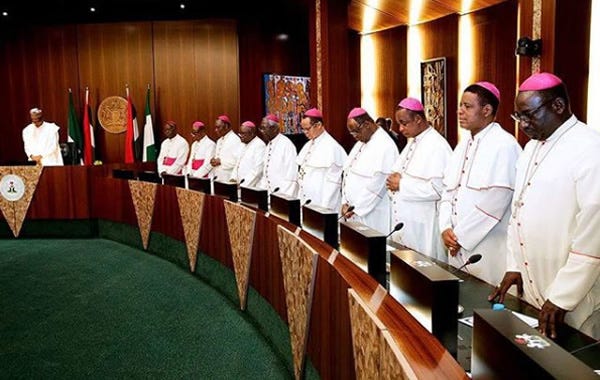
#2.
Nigeria created ECOWAS via the Treaty of Lagos in 1975 in order to integrate the economies of the West African nations. However, over the years, the organization has also been used to implement Nigeria’s own national and regional security interests. So if President Tinubu is developing cold feet due to internal opposition within Nigeria then ECOWAS can’t do much about the political situation in Niger.
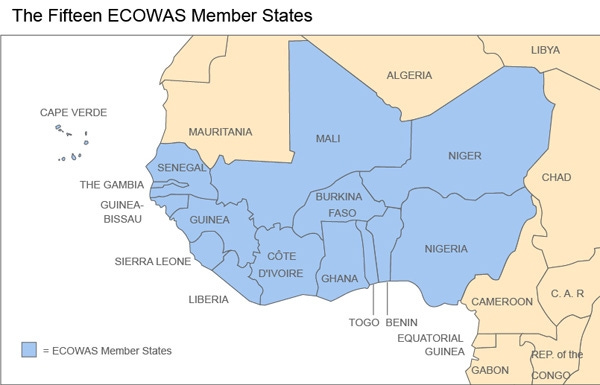
#3.
Opposition within Nigeria has nothing to do with sympathy for the coup leaders. The focus of the debate within Nigeria does not revolve around this “anti-imperialism” angle that is ever present on certain alternative media outlets of the Western world. The issue is whether military intervention is the best way to deal with the military coup. There are those who think Nigerian intervention in Niger will create more problems than it solves.
#4.
At the moment, the Nigerian Senate continues to approve punitive measures such as the ongoing economic blockade and deprivation of free electricity to Niger. As Nigeria contributes 70% of the electricity used in Niger, there are widespread blackouts in that poor arid country. Some people in Nigeria have also voiced opposition to these punitive measures too. But for now, those voices have not yet become overwhelming.

#5.
Retired government officials of Niger have written a letter to Nigerian President Bola Tinubu asking him to restore the free electricity supply and end the economic blockade imposed on their country. I doubt Tinubu will pay any attention to that letter. Only thing that can change Tinubu's mind is if domestic opposition within Nigeria to the blockade and withdrawal of electricity becomes massive. Many Nigerians may not support the coup, but they are not comfortable with punitive sanctions placed on Niger, which is hurting ordinary people.
SITUATION INSIDE NIGER REPUBLIC
#6.
President Bazoum is said to be reduced to be eating dried rice fed to him by the coup leaders. There are unverified claims that the coup leaders have threatened to kill him if ECOWAS militarily intervenes.
#7.
The Niger military junta is doing nothing to defuse the tensions. Not even the usual promises of conducting a fresh elections within a year, which has pacified ECOWAS in the past and prevented military interventions. Instead the military junta has appointed a Prime Minister and some other cabinet officials in an attempt to create some sort of “government” that will consolidate their military coup.
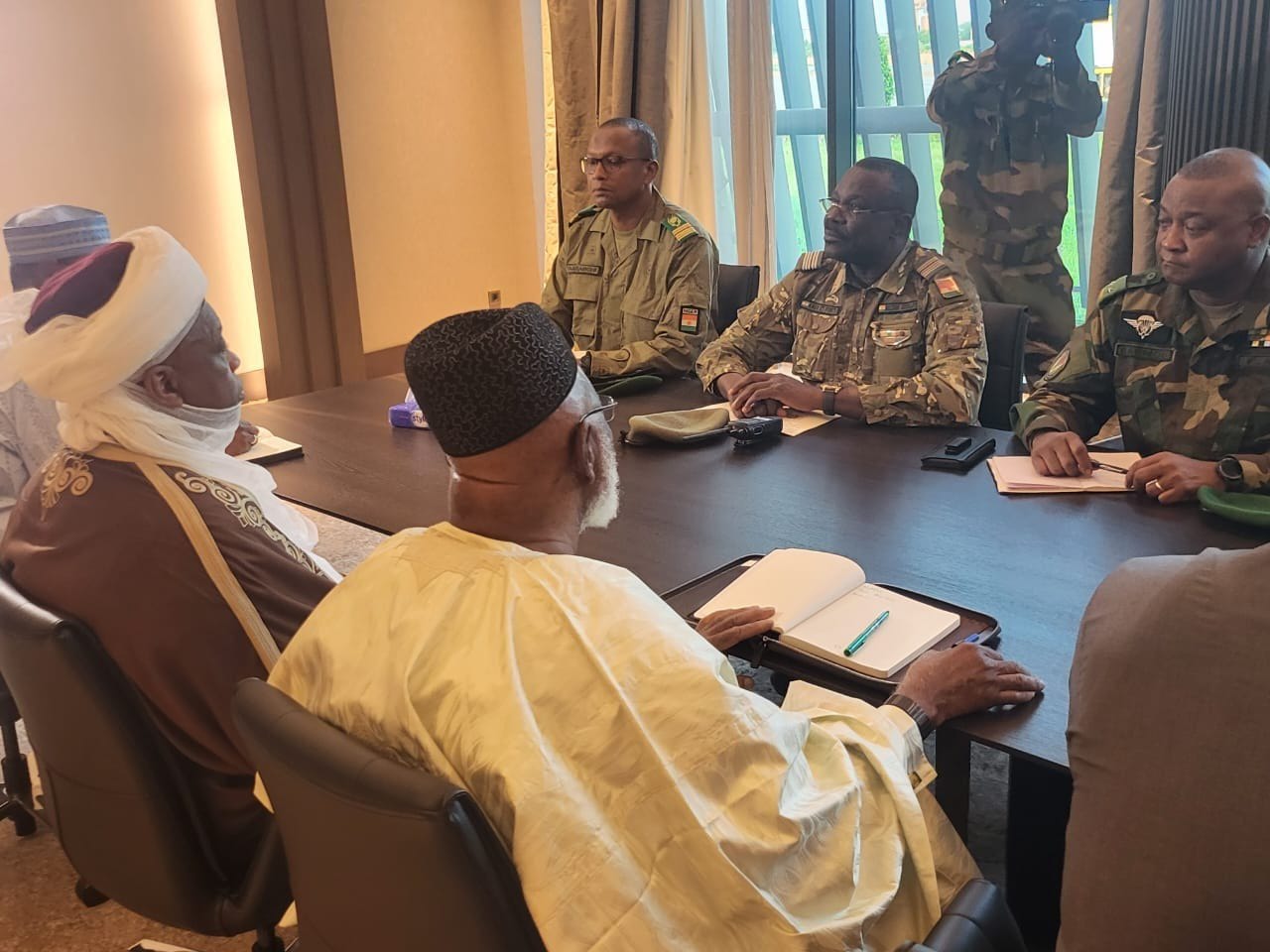
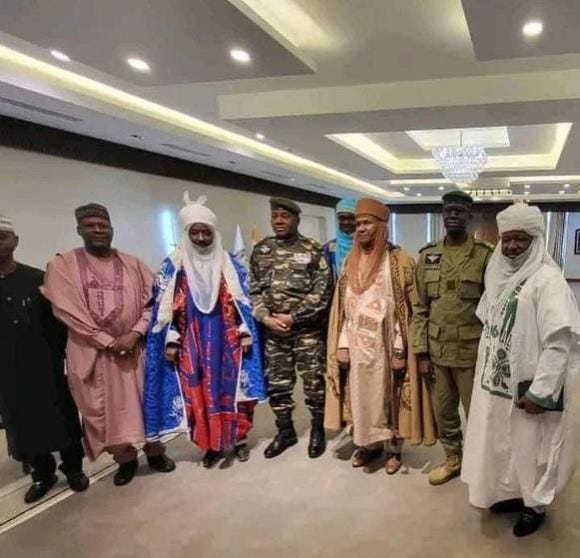
None of the Northern Nigerian dignitaries coming to Niger Republic has made a dent on the attitude of the coup leaders of Niger. The list of dignitaries include former Nigerian Head of State Abdulsalami Abubakar, the Sultan of Sokoto Mohammed Sa’ad Abubakar III and economist-turned-spiritual leader Sanusi Lamido Sanusi (also known by his regnal name, Muhammadu Sanusi II, as he was the former Emir of Kano).
Niger coup leaders have moved troops to the capital in preparation for a possible intervention by Nigerian-led ECOWAS. But frankly, their military is too small and not that well-trained. So it is doubtful, they would able to resist Nigerian firepower if it were to come at them.
#8.
I have mentioned in my first article that the ousted President Bazoum draws his support from historically restive Northern region of Niger where most inhabitants are ethnic minorities of mixed African and Arab descent. Bazoum is the first person from the minority Diffa Arab community to be elected President of Niger. Just like ethnicities of Northern Niger, Diffa Arabs, who reside primarily in the Eastern part of the country, feel discriminated against. And there was an attempt in 2006 to expel them from Niger, sparking protests.
Many Northern Niger citizens of various ethnicities who supported Bazoum and demonstrated against his coup, but were dispersed by police. Video clips shown on social media of people celebrating the coup are just those of Southern Niger citizens in the capital city of Niamey. It is obvious from their dark skins and the Hausa being spoken in these videos. Northern Niger people tend to be lighter skinned as shown below:

Until a few years ago, a low intensity conflict raged between Northern Niger rebels and the government of Niger dominated by Hausa-speaking South Niger ruling elites. That conflict was somewhat frozen after peace talks mediated by ECOWAS and African Union. Now one of the ex-rebel leaders, Mr. Agali Alambo, is beginning to make noises about resuming the conflict if ECOWAS won't intervene to restore Bazoum who has his support base in the North. Of course, the former rebel leader may be bluffing.
As an aside, Agali Alambo was one of several rebel leaders of Northern Niger that received financial and military support from former Libyan Head of State Muammar Gaddafi in their fight against various governments of Niger.
#9.
Some social media accounts on Telegram and Twitter are spreading old videos from 2006, which shows a Russian jetliner landing in the Niger capital city of Niamey, and trying to pass it off as Wagner mercenaries flying to the rescue of the Niger military junta.
The video is obviously false, but that does not mean that Prigozhin's mercenaries could not have sneaked into Niger by crossing over from Mali. Although, I have to say that the Mali-Niger border is way too far from the potential theatre of any conflict, Nigeria may be preparing for. Having said all of that, there is no proof whatsoever that Wagner has entered Niger.
THE DISPOSITION OF MALI, BURKINA FASO AND ALGERIA
#10.
It is false that Algeria said it will come to the defence of the Niger military junta. The position of Algeria is that it does not support the coup d'état in Niger. However, Nigerian/ECOWAS intervention could destabilize the region and Algeria finds this unacceptable. Truth is that if Nigeria/ECOWAS went ahead with the intervention, Algeria will not interfere as it has never done so in the past.
Niger is an ECOWAS state and a core interest of Nigeria. Algeria knows that the ECOWAS rules allow the organization to intervene in member-states experiencing political crisis. Algeria is not part of ECOWAS, but it cooperates with Nigeria on water resource management and regional security as a member of the Nigerian-controlled Lake Chad Basin Commission. Moreover, Algeria and Nigeria are jointly building the Trans-Sahara Gas Pipeline.
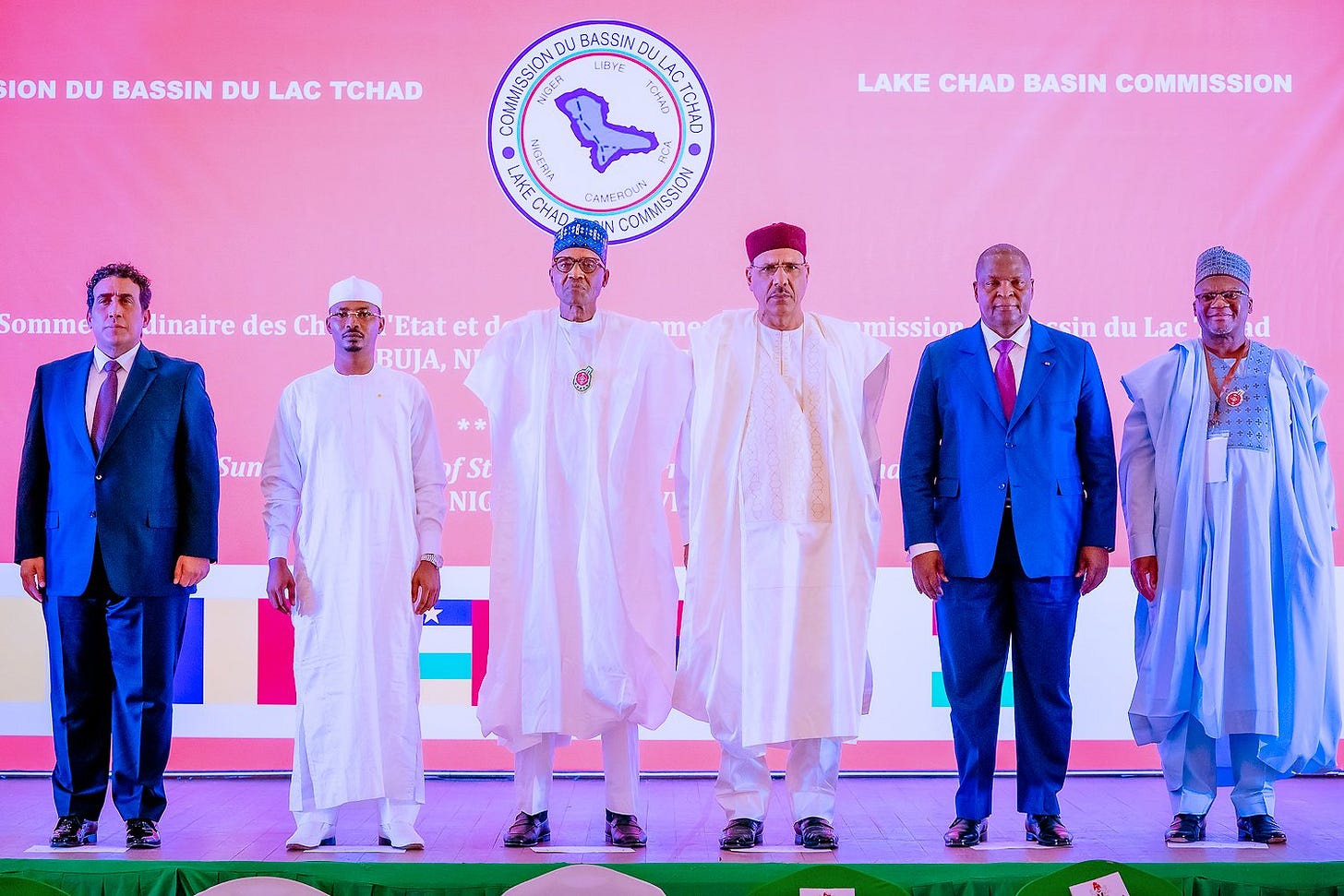
#11.
The military regimes running Mali and Burkina Faso have said they would intervene to help fellow military junta in Niger stave off Nigerian/ECOWAS invasion. The problem here is that both countries do not even patrol their own borders or have the capacity to do so. Both Mali and Burkina Faso have large swathes of territory under the occupation of jihadi terrorists. Wagner mercenaries are the ones stopping the terrorist insurgents from overrunning both countries. None are really in any position to send meaningful help to the Niger coup leaders should Nigerian armed forces decide to cross the border.
SECOND ECOWAS SUMMIT IN ABUJA CITY, NIGERIA
#12.
Nigerian President Bola Tinubu convened a second ECOWAS Summit On the Niger Crisis in the capital city of Abuja on Thursday, 10 August 2023. At the well-attended meeting, the President of ECOWAS Commission Omar Alieu Touray—a former Gambian diplomat—called on the organization’s standby military force to be ready to enter Niger.
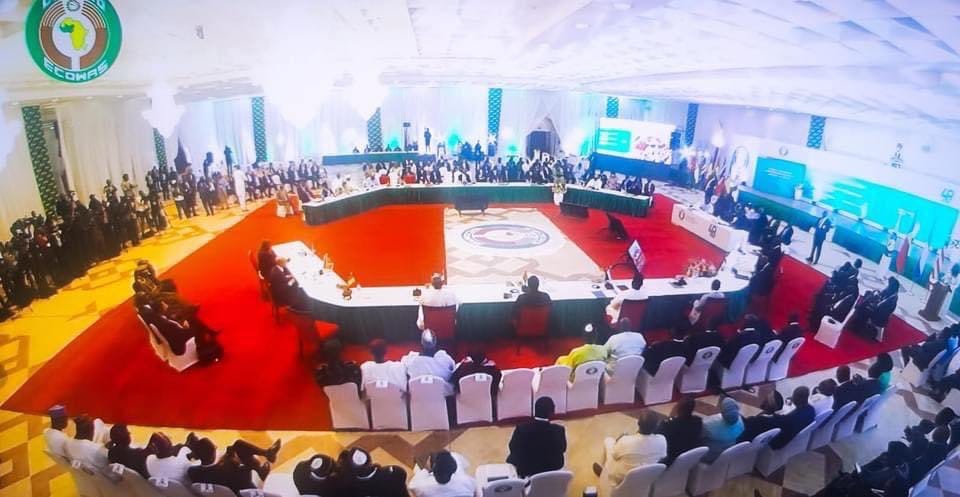
As I have already explained before, ECOWAS stopped being a purely economic organization in 1990 when it created a Nigerian-dominated military force to intervene in the First Liberian Civil War (1989-1997). Since then, that standby military force have intervened multiple times in various conflicts across West Africa.
Since 6 August 2023, the Nigerian Air Force has been patrolling skies just outside Niger airspace and troops of the Nigerian Army are at the border. Those are the “ECOWAS standby force” that Mr. Omar Touray was obliquely referring to.
In the meantime, military chiefs of countries belonging to ECOWAS assembled in the Ghanaian capital city of Accra for their own meeting:
#13.
I get the sense that Tinubu may be getting cold feet while other smaller West African states such as Senegal, Gambia and Benin are urging ECOWAS military intervention to restore constitutional order— a roundabout way of telling Nigeria to send its army and air force across the border.
I read the ECOWAS communiqué carefully. The hardline stance of the smaller member-states were fully accommodated. The communiqué urges a continuation of ECOWAS sanctions against Niger, which amounts to Nigeria's economic blockade and withdrawal of free electricity. The statement urged military intervention to restore constitutional order. But that is somewhat contradicted by the next line, which says that ECOWAS remains committed to restoration of constitutional order by peaceful means.
I believe that the last line about using peaceful means to restore President Bazoum to office was probably inserted at the insistence of Bola Tinubu who is facing domestic opposition within Nigeria and is increasingly becoming hesitant about using military force to solve the Niger political crisis.
Below is a video of the ECOWAS President Omar Alieu Touray reading out parts of the communiqué on live television :
#14.
African Union (AU) has issued a statement backing the communique of ECOWAS and urging the international community to help save the life of President Mohammed Bazoum. The AU posted its full statement on its official website. The English version of the statement can be found by clicking here while the French version can be accessed by clicking here.
The African Union— unlike its predecessor, the Organization of African Unity (OAU)—has adopted a tough stance on military coups, which have been identified as one of the sources of political instabilities that beset the continent in the 1960s, 1970s, 1980s and 1990s.
Historically, military coups in the continent have often occurred due to internal political fissures within an African state or due to external meddling of powerful countries such as USA or France. Either way, there is growing hostility among pan-African institutions to the idea of military coups, which were commonplace in the past and had triggered civil wars in certain countries.
In other words, coup leaders in various African countries claiming “anti-imperialism” as an excuse for seizing power are not likely get a sympathetic hearing from organizations such as the AU, SADC or ECOWAS.
The reason for this deep cynicism is quite simple—African history is filled with military coup leaders insincerely claiming to have overthrown their elected predecessors in order to save their countries from “corruption” and “external meddling”. More often than not, these coup leaders have turned out to be worse than their predecessors. Just two examples, out of so many, would be Idi Amin of Uganda and Sani Abacha of Nigeria.
Of course, not every coup leader was insincere. Thomas Sankara of Burkina Faso carried out his coup in 1983 to end corruption, IMF indebtedness and French meddling in his country. But he was mostly the exception rather than the rule.
ROLE OF FRANCE, EU AND USA IN THE NIGER CRISIS
#15.
This is where many commentators in alternative media, especially those outside West Africa, are completely clueless. I will start by repeating what I have said in a previous article:
Nigeria has a history of military interventions in the West African subregion. If not for the current geopolitical climate, Nigeria's latest intervention would have largely passed unnoticed by many commentators outside the subregion just as happened when Nigeria intervened in Liberia (1990, 2003), Sierra Leone (1997), Guinea-Bissau (1999, 2012, 2022) and Gambia (2017).
Many of the commentators in the alternative media space of the Western world may wish the best for the African continent, but, more often than not, they are not equipped to understand the nuances inherent in the complex web of relationships and interests that exist among various African states.
Through their narrow field of vision, these commentators only see the jostling of France, USA, UK, Russia and China for influence in Africa, and interpret all moves by African states as either for the Russia-China axis or the USA-French axis.
It never even occur to these commentators that a huge country such the Nigeria could have core national security interests in Niger, which is separate from the geopolitical manoeuvrings of USA and France, both of which are mere interlopers and not native to the landscape. I often notice that many of these commentators have barely heard of the three organizations that Nigeria diligently funds and controls in order to secure its regional and national interests. I am referring to ECOWAS, Lake Chad Basin Commission and the Multinational Joint Task Force (MNJTF).
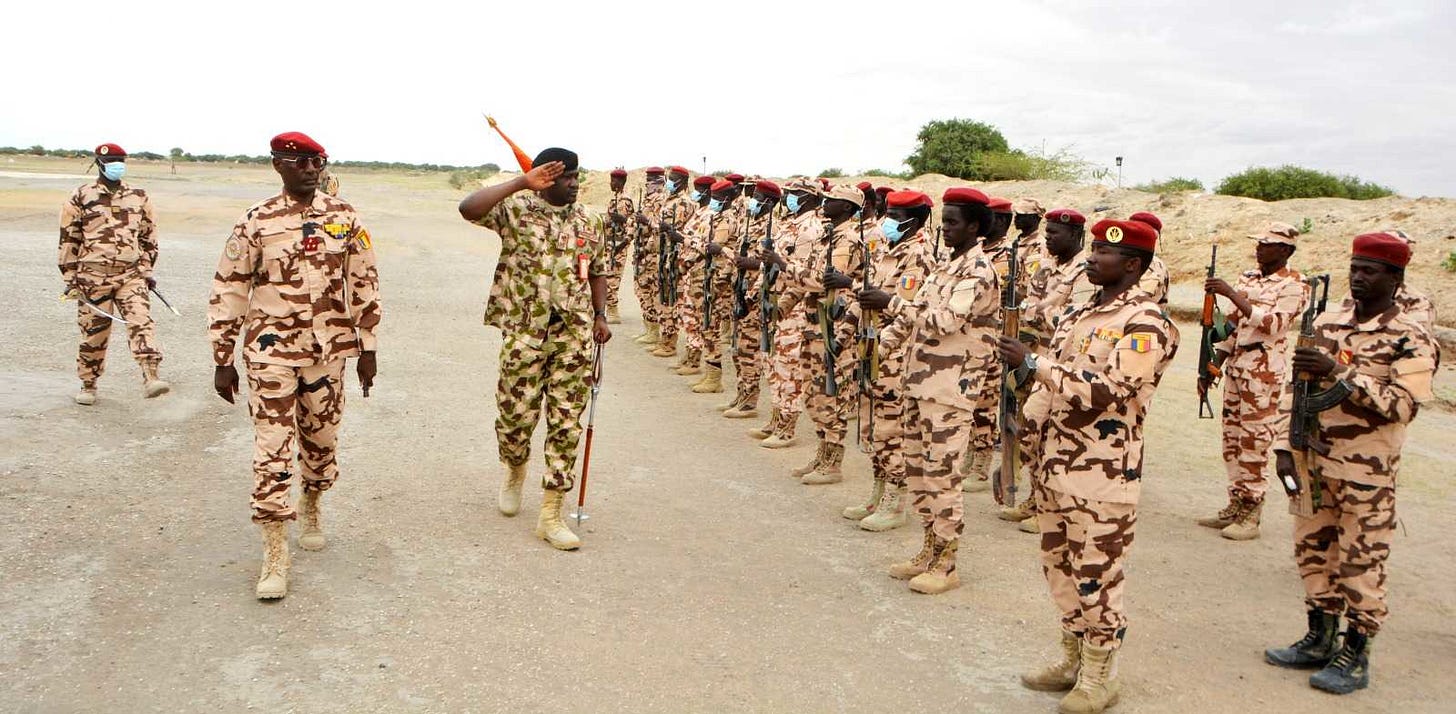
There is a hyper-focus on Tinubu (who is no doubt a corrupt man) as if he is the sole decision-maker inside Nigeria. He is not. There is the national legislature, civil society groups, the local media, respected traditional chiefs and many influential politicians whose views on military intervention must be taken into account by Tinubu.
If Tinubu were the sole decision-maker and an American/French puppet, then Nigerian-led ECOWAS intervention in Niger would have already started as Tony Blinken, Vicky Nuland and Emmanuel Macron have fervently lobbied for.
Instead of immediate military intervention, Tinubu issued a seven-day ultimatum and got the smaller ECOWAS member-states to go along with it. Then, Tinubu sent respected Northern Nigerian emissaries on a fruitless search for a peaceful ending of the crisis. Coup leaders rejected all proposals from the emissaries and the deadline passed without any action taken.
With his bluff called, Tinubu convened a fresh ECOWAS meeting, where the smaller member-states insisted on military force to restore constitutional order in Niger and ensured that their hardline opinions were written into the final communique.
Not wanting to be propelled by the smaller member-states into a military confrontation that he was now having second thoughts about, Tinubu had a contradictory sentence appended at the bottom saying that ECOWAS remains committed to restoration of constitutional order by peaceful means.
There is no doubt in my mind that France, the EU and USA are incredibly frustrated by Tinubu's lack of decisiveness, but he is definitely not their puppet in any way or fashion. Nuland or Macron may not give a damn about a possible refugee crisis in Niger following a military intervention, but Tinubu does. Not because he is a humanitarian, but because it will damage his political standing in Nigeria, especially among Northern Nigerians who form a formidable support base for his political party, All Progressives Congress.
Unless, Tinubu can find a way to neutralize domestic opposition, it is doubtful he would be willing to order the Nigerian Air Force circling the skies and troops of the Nigerian Army at the border to enter Niger. It is as simple as that.
Officials of France, EU and USA have mostly been reduced to following Nigeria’s meandering political system instead of calling the shots.
#16.
Now, let us talk about world uranium production and Niger’s place in it...
According to data from the World Nuclear Association, in 2022, Niger was responsible for just 4.1% of the total amount of uranium produced in the world. There are bigger producers of uranium in the world such as Kazakhstan (43.4%), Canada (15.0%), Namibia (11.5%), Australia (8.4%), Uzbekistan (6.7%), Russia (5.1%).
For decades, France imported uranium primarily from three countries to operate its nuclear power stations: Kazakhstan (27%), Niger (20%) and Uzbekistan (19%).
Since last year, France has expanded the number of its suppliers to include more countries. Russian uranium was not sanctioned and so, some of it has made its way to France to the chagrin of Greenpeace activists. As a result of this diversification drive in France, Niger's supply had already fallen to 15% of the total before the coup.
The coup leaders in Niger have banned uranium supply to France, but this is not an immediate danger as France have stockpiles of uranium already bought over the years. And Niger's supply of uranium can be replaced by simply buying more from Kazakhstan, Canada, Namibia, Australia and Uzbekistan. And in extreme circumstances, Macron could reopen the depleted uranium mines inside France, which was shut down in 2001 because it was much cheaper to get supplies from overseas than produce locally. But that won't even be necessary as there are way bigger producers of uranium in the world willing to sell to France.
Bottom line is France can do without Niger's uranium. What alarms Macron government about the military coup in Niger is not uranium supplies, but yet another blow to French influence in a Francophone African country and the humiliating spectre of Russia gaining influence, which the Kremlin never even worked for.
US troops in Niger Republic are from the era of the so-called “Government War On Terrorism” (GWOT). While in office, President George Bush Jr., and, later on, President Barack Obama, repeatedly offered American troops to “help” Nigeria’s fight against cross-border jihadi terrorists. And on each occasion, Nigeria politely refused the “help”—preferring to use its own armed forces and the Multinational Joint Task Force for that purpose.
Eventually, those unsolicited American troops, initially offered to Nigeria, ended up in neighbouring Niger Republic with the ostensible task of “training Niger soldiers to fight terrorism”.
US government officials don’t care about Niger, one way or the other. They don’t necessarily see the arid country as a strategic asset. Niger is a secondary producer of uranium as its share in world production is just over 4%. Two-thirds of the world’s production of mined uranium comes from Kazakhstan, Canada and Australia.
The only thing that currently worries American officials is Niger Republic falling under the influence of Russia. That would be humiliating for them.
If the coup leaders were perceived as hostile to both Russia and France, the Americans would happily accept the military junta in Niger. What France wants or needs is furthest from the minds of Tony Blinken, Jake Sullivan and Victoria Nuland. For those American officials, it is all about Russia. They couldn't care less about Macron's lamentations about the unravelling of La Francafrique.
#17.
There is no doubt that France and USA desperately wants ECOWAS to intervene in Niger. Both countries are frustrated and disappointed that a military intervention has not already begun. But the fact of the matter is that the final decision to intervene does not rest with those NATO countries. An actual ECOWAS intervention would depend a lot on the domestic political situation both in Nigeria and in Niger Republic. Until then, Nuland, Blinken, Sullivan and Macron would have to read the tea leaves like everybody else.
It may sound counter-intuitive to some readers, but large African states like Nigeria, South Africa and Egypt have actually said “no” several times to successive US governments over the years.
In the early 2000s, Nigeria rejected President George Walker Bush’s attempt to locate African Military Command (AFRICOM) headquarters anywhere in West Africa. When Liberia said it was willing to host the headquarters, Nigeria sent an immediate démarche to the Liberian government, which at the time was reliant on Nigeria's Police and Army to keep law and order within its territory.
Similarly, South Africa blocked any attempt to locate AFRICOM within the wider Southern African subregion. Egypt, Algeria and Libya also opposed any siting of the headquarters of the US military formation within North Africa.
As a result of this, AFRICOM is still in its “temporary” location of Stuttgart, Germany, almost two decades after the African continent rejected it.
In 2012, during Obama's presidency, USA lobbied hard for Nigeria to send troops to Somalia to fight Al-Shabaab terrorists. The Nigerian government refused because Nigeria has no security interests in Somalia beyond making sure that its commercial ships are not hijacked by seafaring pirates. But that same year, Nigeria organized for ECOWAS troops to intervene in Guinea-Bissau where it has real regional security interests.
To the dismay of the French, and the Americans, Nigeria also refused to use ECOWAS to intervene in Mali and Burkina Faso after their own military coups because none of them share a land border with Nigeria, because the Nigerian military thought that it would be more destabilizing to move into two highly unstable countries, which had already lost large swathes of territory to jihadi insurgents. For example, the Traoré military regime running Burkina Faso has full control of just 60% of the country’s territory, the remainder has been rendered ungovernable by jihadi insurgents crossing the barely patrolled international border that Burkina Faso shares with Mali.
CAN FRANCE, USA OR BOTH TAKE DIRECT MILITARY ACTION AGAINST THE NIGER JUNTA?
#18.
United States has no history of direct military interventions to remove governments in African states. Its own history is the usual cloak and dagger use of Central Intelligence Agency (CIA) officers to subvert governments and have them removed. This could come in the form of sponsoring rebel fighters in order to trigger and keep a civil war going, as happened in the pro-Soviet nations of Angola and Mozambique. Or it could be the old-fashioned assassination strategy, as happened to Prime Minister Patrice Lumumba of D.R. Congo in the early 1960s. Whatever subversion method that is chosen by the Americans can often be painstaking and may take months or even years to take effect.
While France did commit its fair share of assassinations of nationalist and communist politicians of Francophone Africa in the 1950s, 1960s and 1970s using its now defunct secret service, the SDECE, the main method of dealing with African leaders hostile to France was simply to send French troops domiciled in local French military bases to overthrow them.
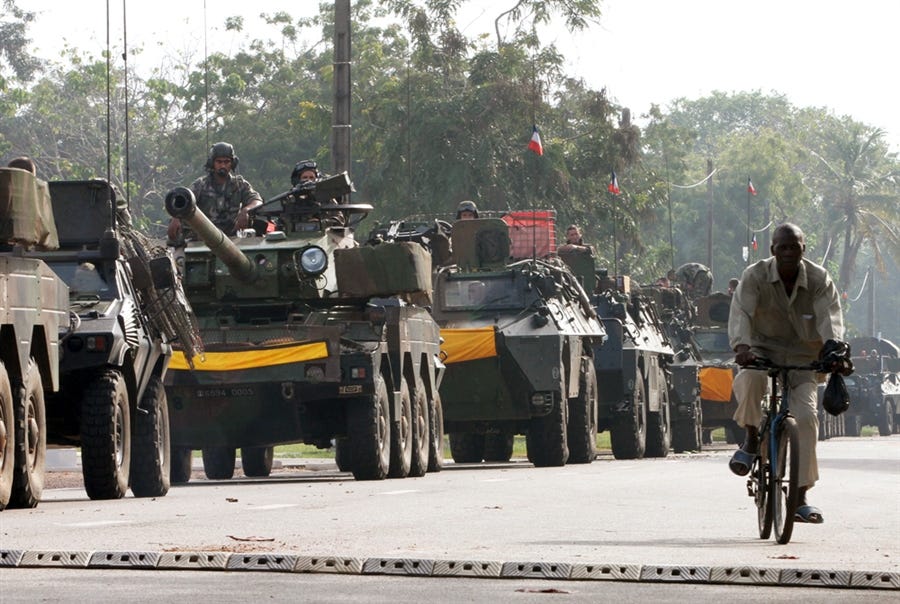
The last time, France removed an African leader was in 2011 when the Ivorian government of President Laurent Gbagbo was overthrown by French troops who burst out of their military bases in Ivory Coast and rode in long columns of armoured vehicles to the Presidential residence of the former Professor of History to remove him from power amidst a civil war. France did not even wait for ECOWAS, which had the right to intervene, if it so wished, because Ivory Coast is a member-state.
After his overthrow and arrest on 11 April 2011, Professor Gbagbo was flown to The Hague in Netherlands. There, he was tried in the International Criminal Court (ICC) and then released in February 2020 after the ICC judges dismissed the charges of “crimes against humanity” levelled against him.
Gbagbo was the first former Head of State to be taken into ICC custody.
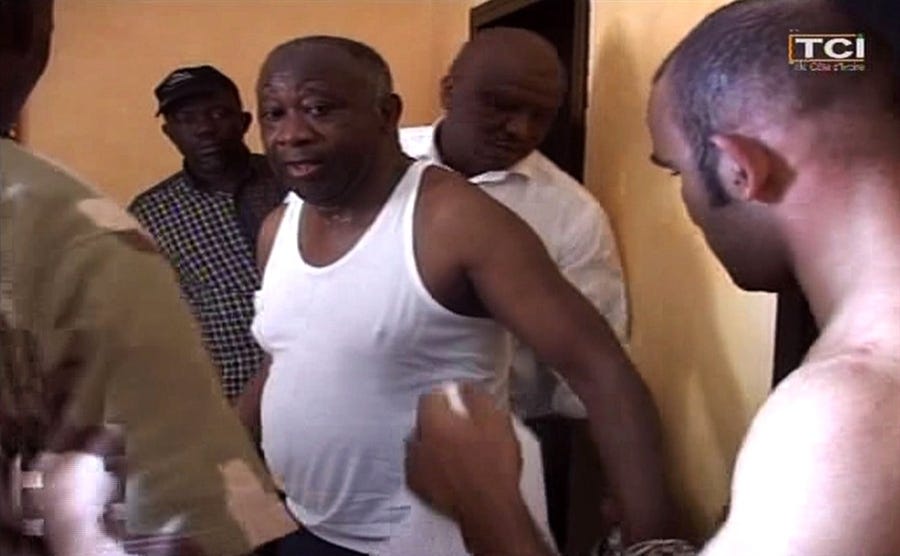
Would France be able to do something so brazen to coup leaders of Niger in the year 2023? The answer is “no”. France is no longer the great power it used to be in Africa. The last French President who had the clout to carry out such a daring attack within the borders of an African state was Nicolas Sarkozy.
Just like American officials, Vicky Nuland and Tony Blinken, the French leader, Emmanuel Macron, would not dare take direct military action in Niger as that would be politically difficult and there is no guarantee that military action would work out. France has no true military bases in Niger Republic. The number of French troops currently inside Niger is not large enough to mount a proper military action. Likewise, American troop numbers are also not sufficient.
WOULD ECOWAS STILL INTERVENE MILITARILY IN NIGER?
#19.
Yes, it is possible. Like stated before, the army and air force of Nigeria are already on standby, ready to intervene in the name of ECOWAS. The only reason why it has not already happened is Tinubu facing internal pressure within Nigeria not to enter Niger. Again, it is not because there is widespread sympathy for the coup leaders.
On the contrary, many ordinary Nigerians are horrified by it because it recalls a distant era when Nigeria itself was under the jackboots of kleptocratic military rulers who stole the country blind and imprisoned or killed political opponents, all while pretending to be saviours of the country.
The last military dictatorship in Nigerian history (1993-1998) was led by the psychopathic General Sani Abacha who stole, imprisoned and killed even as he positioned himself as a bitter opponent of the US government of President Bill Clinton. Visiting foreigners—such as the highly controversial Black American leader Louis Farrakhan— repeatedly defended Abacha because they believed his claims that he was “anti-imperialist”.
At the present time, the security services and military establishment of Nigeria are mainly concerned with border security and fears that the successful push of ISIS-aligned Boko Haram terrorists to the northernmost fringes of the country could be undone by political instability in Niger Republic, which shares a 1,600-kilometre border prone to jihadi infiltration.
The security services and military of Nigeria are the ones who had steered Tinubu towards intervention to eliminate the military junta in Niger. The Americans, the French and the EU bureaucrats merely piled on top of the pressure already being exerted on Tinubu by Nigeria’s security and military organs.
However, Tinubu is a civilian politician and therefore has to consider the feelings of the Northern Nigerian voting base of his political party before authorizing any military charge across the border.
#20.
ECOWAS has already issued its communique, which has some contradictions within it. But it is clear that many of the smaller member-states want Nigeria to intervene as soon as possible in Niger.
Tinubu would probably only intervene if the political situation in Niger were to suddenly degenerate sufficiently to neutralise domestic opposition within Nigeria.
For instance, if the Northern Niger rebels were to trigger a resumption of the frozen insurgency, then that may silence internal critics of military intervention in Nigeria and allow Tinubu to act.
Of course, if the coup leaders follow the standard trajectory of Niger history and fight among themselves for power, then that could also cause enough political instability in Niger to neutralise domestic opposition within Nigeria and allow Tinubu to intervene militarily.
If the Niger military junta acts on its threat and kills President Bazoum, the outrage within Nigeria could also defuse domestic opposition and allow Tinubu to intervene and restore elements of the overthrown Bazoum government back to power.
#21.
Another way could be for Nigeria to hand its military equipment to the smaller member-states of ECOWAS who want military intervention. Nigeria could give its military gear to Senegal, Ghana, Togo and Benin to do it. Nigerian Air Force could air-lift Senegalese, Togolese, Ghanaian and Beninese troops to the Nigeria-Niger border and let them go in. But this looks like a long shot to me. Without Nigerian involvement, ECOWAS military intervention may not be successful in uprooting the Niger junta.
#22.
I would like to conclude my article by going down memory lane. In 2016, ECOWAS was grappling with a constitutional crisis that had engulfed Gambia after its presidential election. Long-time military ruler of Gambia, Colonel Yahaya Jammeh, had run against his civilian opponent, Adama Barrow, and lost the 1st December 2016 Presidential Election.
Initially, Jammeh had accepted the results and admitted defeat. That was until Barrow made a fiery speech saying that he would prosecute Jammeh for human right abuses once he takes power. Upon hearing Barrow's speech, Jammeh rejected the election results and made vague claims about “voting irregularities”. Meanwhile, Barrow fled to Senegal to avoid being arrested by Jammeh's government.
ECOWAS, African Union and the UN Security Council condemned Jammeh's attempt to cling to power after admitting initially that he had lost the Presidential election.
Nigeria issued the standard ultimatum to Yahaya Jammeh to stand down and let Barrow take power. Jammeh ignored the ultimatum and issued defiant statements. Peace talks were attempted, but those achieved nothing. The ultimatum expired and the year 2016 ended without ECOWAS acting on its threats.
At the beginning of January 2017, it looked like Nigeria/ECOWAS were simply bluffing and would not do anything after all. Then, out of the blue, Nigerian-led ECOWAS ground forces, which included Senegalese, Ghanaian, Malian and Togolese soldiers, entered Gambia on 19 January 2017. Nigerian Navy began to patrol Gambia's coastal waters while Nigerian Air Force entered Gambian airspace.
The Gambian Navy surrendered without a fight. The Gambian Army split. Some stayed loyal to Jammeh. The others surrendered to the Nigerian-led ECOWAS troops.
In the end, Yahaya Jammeh agreed to relinquish state power in Gambia and ECOWAS arranged for him to proceed immediately on permanent exile to Equatorial Guinea, where he remains till date. ECOWAS troops remain stationed in Gambia even as I write this.
Would the same thing happen to Niger coup leaders? Only time will tell.
THE END
Dear reader, if you like my work and feel like making a small donation, then kindly make for my Digital Tip Jar at Buy Me A Coffee


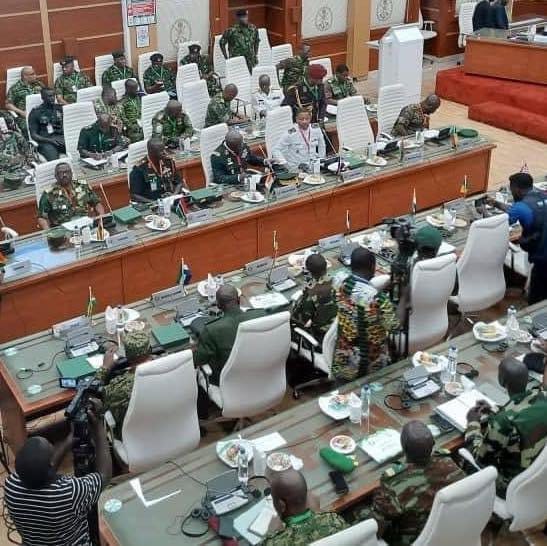

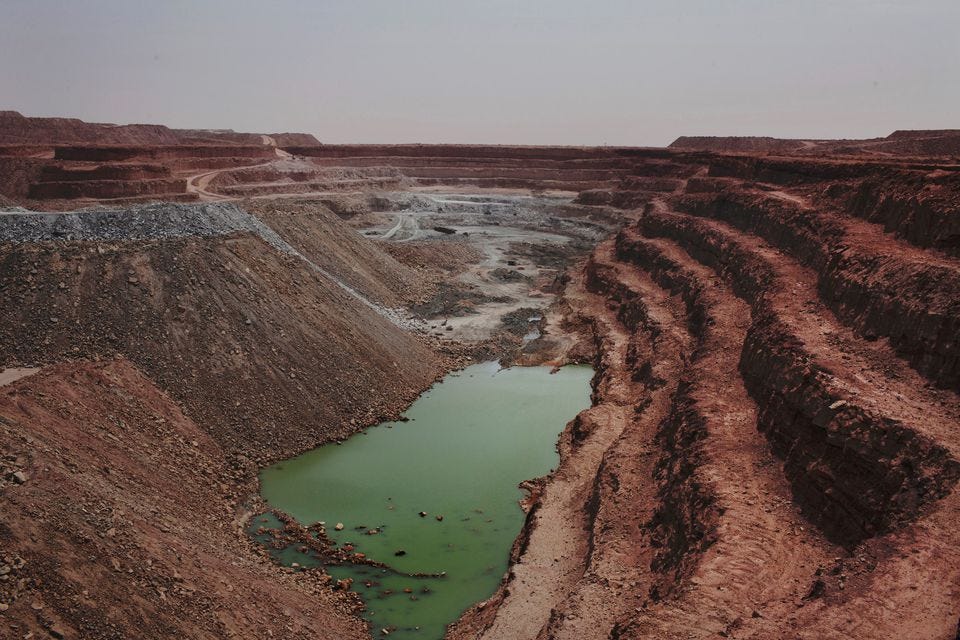

"What alarms Macron government about the military coup in Niger is not uranium supplies, but yet another blow to French influence in a Francophone African country". Indeed.
What is hardly mentioned in the press is that soon after his first election to the presidency in 2017, Macron chose as his legacy construction the costly renovation of a dilapidated royal castle known for the signature of the Villers-Coterets Act of 1539 which instituted French as the official administrative language of France instead of latin and reinforced control over the church, solidifying king François Ist's grip on the kingdom. Macron's project was to turn it into a "Cité internationale de la langue française", and to found his foreign policy on the soft power domination of the French language. Of course this was as immature and misguided as most of his political decisions, and inconsistent with the fact that he praises himself to be the first French president to express himself publicly in English, which in fact is often an embarrassment (and even led to the suppression of some tweets) his command of the language being shaky at best.
But back to the Villers-Coterets project. Since president Pompidou, each French president has left a new trophy cultural institution as his legacy (centre Pompidou, Orsay museum (Giscard d'Estaing), second national library (Mitterrand), museum of non-western civilizations (Chirac)). Macron, the first of a generation who grew up in the ersatz of American culture that now permeates France's popular culture, did not read the tea leaves and chose what was a former nursing home located in a pauperized region north-east of Paris with one of the lowest rates of literacy in the country, to house his ambitions to renew France's influence over Africa through the French language. The grandiose project was announced to be opened in March 2022 (before the next presidential election) but the opening was postponed several times and is now scheduled for October 2023. In the meantime, one poor enclaved former colony after the next is dumping French as an official language as Macron's clumsy handling of African affairs and his avowed attempt to use the French as a domination tool backfire. How many chiefs of state will show up in October? That will be a test of what remains of French cultural prestige.
Paradoxically, the institution could also be the last nail in the coffin, considering how pitiful the state of the French language is inside France itself, where a bastardized American gibberish now reigns supreme, and where national funerals are bestowed by Macron on a fake American rock singer unknown outside of France (Jean-Philippe Smet aka Johnny Halliday) while a world-renowned French singer who has sung in French in many countries (Charles Aznavour) is buried without fanfare.
Excellent piece, I learned quite a few things about the situation. It's the most detailed explanation on what's really happening there